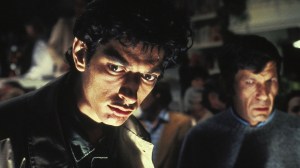Actor Tobin Bell has had a long and diverse career, taking roles in a number of exciting movies and TV projects over the years, but it was his turn as John Kramer in 2004’s Saw that made him a fan-favorite performer among horror fans. Over the last 15 years, his fandom in the genre has afforded him a number of opportunities to get involved in more genre projects, the latest of which is The Call. Funnily enough, while Bell has starred in quite a few genre films over the years, he doesn’t personally have a strong connection to the genre, instead approaching each role as its own compelling opportunity. The Call is now playing in select theaters and drive-ins.
Videos by ComicBook.com
From the creator of Final Destination, Lin Shaye and Tobin Bell star in this terrifying tale of death from the fall of 1987. After a tragic accident, a group of small-town friends must survive the night in the home of a sinister couple. One by one, their worst nightmares quickly become reality as they enter the realm of The Call. Four Friends. One Phone Call. 60 Seconds. Stay Alive.
ComicBook.com recently caught up with Bell to talk about his new film, the horror genre, and if he could ever return to Saw.

ComicBook.com: Since you are in a lot of horror movies, a lot of fans revisit your films during the Halloween season, with The Call being another film they can watch to get into the spirit of the season, but do you personally do much to celebrate Halloween?
Tobin Bell: I don’t quite know how to say this, but I don’t think about Halloween, to be honest with you. I’m aware of it, obviously, that it’s coming up, that we just crossed the threshold into October. And I’m aware of it because other people bring it up all the time. When I was a kid, it was relatively important. And when I was, I have two kids myself, when they were young, it was fun and relatively important.
But I don’t honestly think about the horror genre. I’ve done so many different kinds of films and played so many different kinds of roles in television, from Southern farmers to pioneers to astronauts to cowboys to priests, that, the horror genre, I was never particularly into the horror genre until I did Saw. And then, now, since I’ve met thousands and thousands of fans, I understand their dedication to the genre, which is very, very potent as an actor. For example, with The Call, I don’t go up there thinking, “Oh, this is a horror film.” I go thinking about Edward Cranston. I go into it thinking about, he’s a husband, he’s a businessman, he cares about his wife, what do they do every day? Where do they live? How does he make his living?
I’m not thinking of the genres, that’s for the press to put a label on. Actors take their roles in terms of, “What is the humanity of this person?” And what’s the reality of his person. It doesn’t become a genre until after the whole thing is shot. Now, obviously, the writers and the producer, the people who come up with the money, say, “Oh yeah, this is a horror film.” But when you’re an actor, at least me, I can only speak for myself, I don’t think about the whole, you know, all of that. I think simply about how I feel about my wife, for example, and why I do what I do. How I do what I do, who am I, where am I, what do I want, when do I want it, and how am I going to get it. That’s what I’m thinking about, basic foundation.
And then the camera sees everything and it will become what it will become, and because I’m talking to these kids about this call does not mean that I know what’s going to happen later on. Somebody does, who has read the script, and identifies it as a horror film. [My character is] just setting up a business deal here.
So I don’t know if I’ve answered your question, but I’m trying to get the whole idea. When people say to me, “How’s it feel to be a horror icon?” I don’t know what the hell that … I mean, obviously, I know what it means. I know what it means, but I, as an artist, you don’t think about that. You think about each job, doing each thing to the absolute best of your ability, and bringing as much reality to what you do as you possibly can. And the rest will take care of itself.
You talk about your interests with your character in The Call, and I would say your screen time in the film is less than the younger characters in the film. When you see a project like this, where you’re playing almost like this Vincent Price figure, you’re setting the stage for these other characters, and you have these scenes with Lin Shaye’s character, but when you have that limited screen time, is it more exciting or more challenging to make the heavier impression upon not just your co-stars, but also the audience with that limited screen time?
Sometimes it has to do with what you say, sometimes it has to do with where you come into a film. I’ve learned a long time ago, it’s not about how many lines you have, it’s where you appear in the story and how much of a fulcrum you are to advancing the story and if you’re part of the solution. For example, if you come into a story and are part of the solution at a particular time, that is huge in terms of screen time. And so it isn’t always about the amount of screen time that you have, it’s about the tension that’s going on at that point, the release of tension that goes on at that point. In my case, Patrick, I was drawn to this film because of that.
I don’t know how long that scene is. I haven’t timed it, but the scene when I invite the kids into my house and they come and they sit down and I spell out to them what it is I want them to do and what their options are, that’s a very long scene. It was a huge challenge to make that scene interesting and not seem like just this long monologue of information. I wanted to do The Call because I wanted to keep my chops sharp as far as executing a scene like that. And with [director] Timothy Woodward’s help and the [director of photography]`s help Pablo Diaz, we were able to get that scene where we wanted to get it and make it feel natural, feel like he lives in this house. This is his house. This is his room and he’s in charge. He’s the conductor.
So that was a joyful opportunity to work out. It’s like, you put LeBron James on a court with a basketball and you know he’s going to shoot every possible corner he could shoot from. He’s going to work on his shot from the free-throw line, he’s going to work from the corner, he’s going to work beyond the three-point line. That’s what an actor wants to do. He wants to sharpen his tools constantly and find ways of making a scene more real because the camera sees everything. And if it’s false, the camera will see it. So, for me, that scene was a wonderful challenge. And I still feel that way about it.
Darren Lynn Bousman directed you in multiple Saw films and he recently said that, had he been asked years ago to return to Saw, he never would have done it, but he did return for Spiral: From the Book of Saw. You seem to have said goodbye to John Kramer, but will there always be a part of you that is open to return or would you rather fans stop trying to make it happen?
It’s about the writing. If the writing is great, if there’s something … John Kramer is a King Lear-sized character. In my view, there’s a huge range to him. He’s interested in a multiplicity of things, from theology to philosophy to music to art, you name it. And it all comes down to the writing. Actors are always looking for great scripts and great characters. I’ve had the wonderful opportunity of playing this guy in, let’s see, one, two, three, four, five…eight films and having an opportunity to develop him and to develop the people he cares about in those films, that’s been great. I can’t, frankly, prophesize about the future. We’ll have to wait and see.
*****
The Call is now playing in select theaters and drive-ins.








